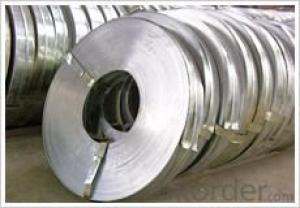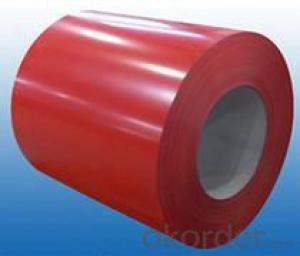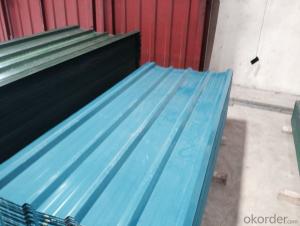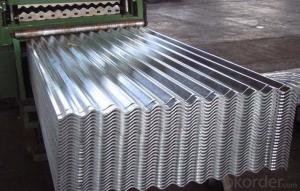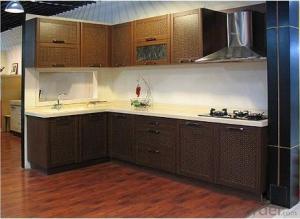Prime quantity Galvanized Steel Coils/Sheets, CNBM
- Loading Port:
- China main port
- Payment Terms:
- TT OR LC
- Min Order Qty:
- 1 m.t.
- Supply Capability:
- 100000 m.t./month
OKorder Service Pledge
OKorder Financial Service
You Might Also Like
Hot dip galvanized steel coil and sheet | |
Technical Standard: | JIS 3302 / ASTM A653 / EN10143 |
Grade | DX51D / DX52D/ DX53D/ S250,280,320GD |
Types: | Commercial / Drawing / Deep Drawing / Structural quality |
Width | 500/650/726/820/914/1000/1200/1219/1220/1250mm |
Thickness | 0.12-4.0mm |
Type of coating: | Galvanized |
Zinc coating | Z30-700g/m2 |
Surface Treatment | Chromed / Skin-pass/ Oiled/Slightly Oiled/ Dry/ Anti-fingerprint |
Surface structure: | Zero spangle / minimized spangle / regular spangle/ big spangle |
ID coil | 508mm or 610mm |
Coil weight | 3-12 MT per coil |
Package: | Properly packed for ocean freight exportation in 20''containers |
Application: | Industrial panels, roofing and siding for painting |
Price terms | FOB,CFR,CIF |
Payment terms | T/T or L/C |
Delivery time | Within 30 days |
Remarks | Insurance is all risks |
MTC will be handed on with shipping documents | |
We accept the third party certification test,such as SGS/BV |
Technical data :
Hot dipped galvanized coil Technical Data
Chemical Composition | ||||||
GRADE | C | Si | Mn | P | S | Ti |
SGCC/DX51D+Z | ≤0.10 | ≤0.50 | ≤0.60 | ≤0.10 | ≤0.030 | ≤0.020 |
DX52D+Z | ≤0.10 | ≤0.50 | ≤0.60 | ≤0.10 | ≤0.030 | ≤0.020 |
SGCD/DX53D+Z | ≤0.10 | ≤0.30 | ≤0.50 | ≤0.05 | ≤0.030 | ≤0.020 |
SGCE/DX54D+Z | ≤0.10 | ≤0.30 | ≤0.30 | ≤0.03 | ≤0.020 | ≤0.020 |
DX56D+Z | ≤0.10 | ≤0.30 | ≤0.30 | ≤0.03 | ≤0.020 | ≤0.020 |
Structural | ≤0.20 | ≤0.60 | ≤1.70 | ≤0.10 | ≤0.045 | |
Hot dipped galvanized steel coil Mechanical Properties | |||
GRADE | Yield Strength MPa | Tensile Strength MPa | Elongation % |
SGCC(DX51D+Z) | ≥205 | ≥270 | - |
SGCD(DX53D+Z) | - | ≥270 | 38 |
SGCE(DX54D+Z) | - | ≥270 | 40 |
DX56D+Z | - | ≥270 | 42 |
- Q:Can steel sheets be used for storage tanks?
- Yes, steel sheets can be used for storage tanks. Steel is a commonly used material for constructing storage tanks due to its strength, durability, and resistance to corrosion. Steel sheets are often welded together to form the tank's structure, providing a reliable and long-lasting storage solution for various liquids and gases.
- Q:Are steel sheets suitable for railway carriages?
- Indeed, railway carriages find steel sheets to be a fitting option. The robustness, resilience, and capacity to endure the ceaseless strain linked with train operations render steel a favored material for these carriages. Steel sheets provide the essential structural strength to uphold the carriage and its occupants, simultaneously safeguarding against impacts and harsh weather conditions. Furthermore, steel boasts relative cost-effectiveness and widespread accessibility, rendering it an optimal selection for the creation of railway carriages.
- Q:Can steel sheets be used for playground equipment?
- Yes, steel sheets can be used for playground equipment. Steel is a highly durable and strong material that can withstand heavy use and harsh weather conditions, making it suitable for playground structures such as climbing frames, slides, and swings. Additionally, steel sheets can be shaped and formed into various designs, offering flexibility in creating engaging and safe play structures for children.
- Q:Are steel sheets resistant to impact and abrasion?
- Yes, steel sheets are generally resistant to impact and abrasion due to their inherent strength and durability.
- Q:What is the difference between coated and uncoated steel sheets?
- The primary distinction between coated and uncoated steel sheets lies in their protective layer and surface finish. Coated steel sheets, also referred to as galvanized steel sheets, possess a layer of zinc coating to prevent corrosion and enhance durability. This zinc coating serves as a sacrificial layer, shielding the underlying steel from rust and other forms of damage. Furthermore, coated steel sheets exhibit a more polished and smoother appearance. In contrast, uncoated steel sheets do not undergo any treatment involving a protective layer. Consequently, they are more prone to corrosion, particularly when exposed to moisture or chemicals. Uncoated steel sheets are commonly utilized in situations where corrosion resistance is not a significant concern, such as in construction projects where the steel will be covered or safeguarded in some manner. Regarding cost, coated steel sheets are generally pricier than uncoated steel sheets due to the additional manufacturing process required to apply the zinc coating. Nevertheless, the increased cost is justified by the improved durability and extended lifespan of coated steel sheets. To summarize, the key disparity between coated and uncoated steel sheets lies in the presence of a protective layer. Coated steel sheets offer superior corrosion resistance and possess a smoother appearance, while uncoated steel sheets are more susceptible to corrosion and possess a rougher surface finish.
- Q:Are the steel sheets resistant to scratching or abrasion?
- Steel sheets exhibit a remarkable resistance to scratching and abrasion. Renowned for its exceptional durability and strength, steel effectively wards off numerous forms of damage, such as scratches and abrasions. Its sleek and solid surface reduces susceptibility to scratches from sharp objects or rough surfaces. Moreover, the robust molecular structure of steel hampers easy wear and tear, guaranteeing its longevity in high-traffic or demanding settings. All in all, steel sheets prove to be an outstanding option for safeguarding against scratching or abrasion.
- Q:What are the most common thicknesses of steel sheets?
- Steel sheets come in various thicknesses, which are determined by their intended use and industry standards. Examples of commonly used thicknesses include 20 gauge (0.035 inches), 18 gauge (0.0478 inches), 16 gauge (0.0598 inches), 14 gauge (0.0747 inches), and 10 gauge (0.1046 inches). These thicknesses are commonly employed in sectors like construction, automotive, and manufacturing. In certain cases, thinner gauges like 24 gauge (0.0239 inches) and 22 gauge (0.0299 inches) may be utilized for lighter applications or when weight reduction is a priority. Ultimately, the chosen thickness will depend on the specific project requirements and the desired structural integrity.
- Q:Can steel sheets be used for automotive exhaust systems?
- Yes, steel sheets can be used for automotive exhaust systems. Steel is a commonly used material for exhaust systems due to its durability, heat resistance, and cost-effectiveness. Steel sheets are often formed and welded to create the necessary components of an exhaust system, such as pipes, mufflers, and catalytic converters.
- Q:Can steel sheets be used for manufacturing sporting equipment?
- Yes, steel sheets can be used for manufacturing certain types of sporting equipment like hockey sticks, baseball bats, and golf club heads. However, they may not be suitable for all types of sporting equipment due to their weight and rigidity.
- Q:Are the steel sheets resistant to UV radiation?
- Yes, steel sheets are generally resistant to UV radiation.
1. Manufacturer Overview |
|
|---|---|
| Location | |
| Year Established | |
| Annual Output Value | |
| Main Markets | |
| Company Certifications | |
2. Manufacturer Certificates |
|
|---|---|
| a) Certification Name | |
| Range | |
| Reference | |
| Validity Period | |
3. Manufacturer Capability |
|
|---|---|
| a)Trade Capacity | |
| Nearest Port | |
| Export Percentage | |
| No.of Employees in Trade Department | |
| Language Spoken: | |
| b)Factory Information | |
| Factory Size: | |
| No. of Production Lines | |
| Contract Manufacturing | |
| Product Price Range | |
Send your message to us
Prime quantity Galvanized Steel Coils/Sheets, CNBM
- Loading Port:
- China main port
- Payment Terms:
- TT OR LC
- Min Order Qty:
- 1 m.t.
- Supply Capability:
- 100000 m.t./month
OKorder Service Pledge
OKorder Financial Service
Similar products
New products
Hot products
Hot Searches
Related keywords
